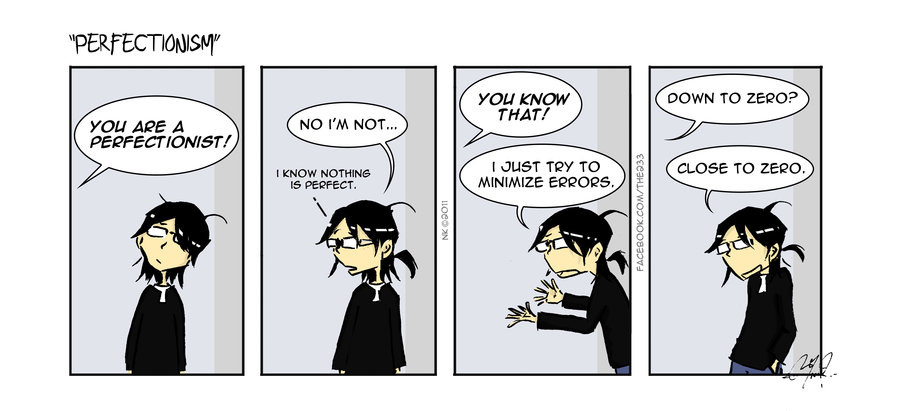The battle of ADHD versus perfectionism
Recognize that imperfection is a reality and follow your dreams!
Did you know that perfectionism is a common symptom in people with ADHD? Although not exclusive to the disorder, it's hard to find someone with ADHD who doesn't have the belief of perfectionism. The problem is that this belief is dysfunctional and causes significant suffering and impairment.
There are variations in the definition of perfectionism, and even different types/dimensions of perfectionism, but some of my favorites are from Brené Brown’s book Daring Greatly: “Perfectionism is a self-destructive and addictive belief system that fuels this primary thought: If I look perfect and do everything perfectly, I can avoid or minimize the painful feelings of shame, judgment, and blame."
Why is it so common for people with ADHD? When going deeper into childhood, it's often possible to identify characteristic patterns such as: severity in upbringing, excessive demands related to performance or behavior, perfectionism from parents or caregivers with their own expectations, criticism, or lack of realistic recognition, among others.
However, ADHD means that the drive for achieving nothing less than perfection goes beyond the environment we have been raised in. Our brains are simply wired to high standards of accomplishment, maybe because we know we can go to great lengths on many things, resulting in us being less open to accept eventual failures or imperfections in the processes we are engaged in.
And this is a pattern we go through individually, fighting with our own minds. It's like our brain systematically refuses the result of our actions, or worse, the planning aspect of our brain operating in disagreement with the operational aspect of it. It can only immobilize us. It's not practical. It blocks us from taking the actions we need to perform a given task.
Sometimes we hear people bragging about alleged perfectionism as a way to increase their social capital. This isn't really perfectionism, but likely pretentiousness or arrogance.
Perfectionism, in fact, isn't sustainable or fulfilling. When we are so inclined to craft meticulously perfect plans, we end up forgetting to actually live our lives.
Perfectionism promises safety and control, but it only leads to exhaustion and disappointment. It doesn't help us manage things or feelings. Instead, it complicates the grieving process. Despite our best efforts, perfect planning doesn't guarantee perfect outcomes.
Actually, it so many times prevents outcomes from happening.
In other words, if perfectionism is a belief, that means it was learned somehow, probably unconsciously, but it suggests that it's possible to neutralize it with appropriate self-knowledge and support.
Instead of detailed blueprints, we need to try to approach life with broad strokes. Outline your vision and leave room for magic and inspiration. As much as you can, be flexible, be open to unforeseen opportunities, and take them as guiding principles. Flexibility is key here because perfectionism is static by definition, and we are training our brain to avoid being fixed and invariable (as is the pursuit of perfection).
Take action, be less attached to results: success comes from effectively doing things, not obsessing over outcomes. By focusing on the front end of the process and taking consistent action, you develop an automatic system of trust in yourself, making desirable results follow naturally. Think less about the aftermath, pretty much like when people say to concentrate our thoughts on the journey, not the destination.
Never forget that life is in the present. Life is about what's happening now, not in the future. It's not an invitation to be irresponsible towards our next moves in life, but to avoid forgetting that we must, need, and deserve to enjoy the present moment. When we stay present and recognize the simple pleasures of life, sometimes we find fulfillment in the most trivial things like walking in a new street or watching our favorite TV show that we have already watched 30 times and love each time more.
Letting go of perfectionism is not only liberating but a key measure for those with ADHD who need to organize their routine better. Instead of striving for an unattainable ideal, recognize that imperfection is a reality and learn to celebrate progress over perfection. It's the leap into the unknown that truly counts, not the landing or the results.
So, let's make our beautiful plans, but remember to live our beautiful dreams. The ones that we are living right now. After all, it's the journey that matters most, and this journey happens at this very moment.
If you've considered subscribing to us before, now is the perfect time. This month, 100% of the revenue generated from subscriptions to this Substack will be donated to organizations directly aiding those affected by the floods in Southern Brazil. These floods have already impacted 2.1 million people and displaced 560 thousand from their homes.






